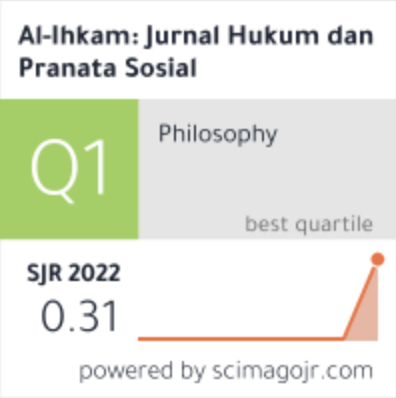Building the Values of Rahmatan Lil 'Alamin for Indonesian Economic Development at 4.0 Era from the Perspective of Philosophy and Islamic Economic Law
 Abstract views: 1857
,
Abstract views: 1857
,
 pdf downloads: 1204
pdf downloads: 1204
Abstract
This research aims to build the value of rahmatan lil 'alamin in Indonesian economic development at 4.0 era from the perspective of philosophy and shariah economic law. The role of both is considered important regarding with freedom to do any economic activities in Indonesia as the non-Islamic state in the formal term yet at the same time is known as a sharia economic community due to its world’s largest Moslem population. This literature-normative research is qualitative with a statutory, historical, comparative and conceptual approach. It found that first, rahmatan lil 'alamin (sheltering the entire ummah and not exclusive to Moslem only) value enables the philosophy of Islamic law to contribute in developing Indonesian economy. The goal of Islam as a religion to guide its believers toward the happiness of the world and the hereafter and the triangle concept among philosophy of God, human, and nature, for example, make it possible for Islamic economic with its rahmatan lil 'alamin values to cover deficiencies of the conventional economic system. Second, the philosophy of rahmatan lil 'alamin in Islamic economics can be manifested by organizing social services, such as waqf, relying on the spirit of building justice in life, narrowing social gaps, as well as enlivening Islamic values. In the era of 4.0, implementation of the value can be adjusted to recent demands and situations, such as cash waqf, halal industry, halal food, halal tourism and so on
(Riset ini bertujuan menggali nilai-nilai rahmatan lil ‘alamin dalam perekonomian Indonesia era 4.0 menurut tinjauan filsafat dan hukum ekonomi syariah. Peran keduanya dianggap penting terkait kebebasan berekonomi dalam konteks Indonesia yang bukan merupakan negara Islam secara formal namun memiliki komunitas ekonomi Syariah sebagai negara Muslim terbesar di dunia. Penelitian kepustakaan-normatif ini bersifat kuantitatif dengan pendekatan perundang-undangan, sejarah, perbandingan, serta konseptual. Ia sampai pada kesimpulan bahwa, pertama, konsep rahmatan lil ‘alamin yang menaungi seluruh ummat—tidak hanya umat Muslim—memungkinkan filsafat hukum Islam berkontribusi dalam mengembangkan perekonomian Indonesia. Tujuan Islam untuk mencapai kebahagiaan dunia-akhirat serta konsep triangle antara filsafat Tuhan, manusia dan alam, misalnya, memungkinkan tertutupinya kekurangan dalam sistem ekonomi konvensional dengan sistem ekonomi Islam. Kedua, nilai rahmatan lil ‘alamin dalam hukum ekonomi Islam dapat diwujudkan dengan menyelenggarakan kegiatan-kegiatan sosial seperti wakaf dengan semangat menciptakan kehidupan yang berkeadilan, mengurangi kesenjangan sosial serta menghidupkan nilai-nilai keislaman. Di era 4.0, implementasi nilai rahmatan lil’alamin dapat disesuaikan dengan tuntutan zaman semisal wakaf tunai, industri halal, makanan halal, wisata halal, dan lain sebagainya)
Downloads
In order to be accepted and published by Al-Ihkam: Jurnal Hukum dan Pranata Sosial, author(s) submitting the article manuscript should complete all the review stages. By submitting the manuscript, the author(s) agreed to the following terms:
- The copyright of received articles shall be assigned to Al-Ihkam: Jurnal Hukum dan Pranata Sosial as the publisher of the journal. The intended copyright includes the right to publish articles in various forms (including reprints). Al-Ihkam: Jurnal Hukum dan Pranata Sosial maintain the publishing rights to the published articles.
- Authors are permitted to disseminate published articles by sharing the link/DOI of the article at Al-Ihkam: Jurnal Hukum dan Pranata Sosial. Authors are allowed to use their articles for any legal purposes deemed necessary without written permission from Al-Ihkam: Jurnal Hukum dan Pranata Sosial with an acknowledgment of initial publication to this journal.
- Users/public use of this website will be licensed to CC-BY-SA.



.png)
_1.png)










